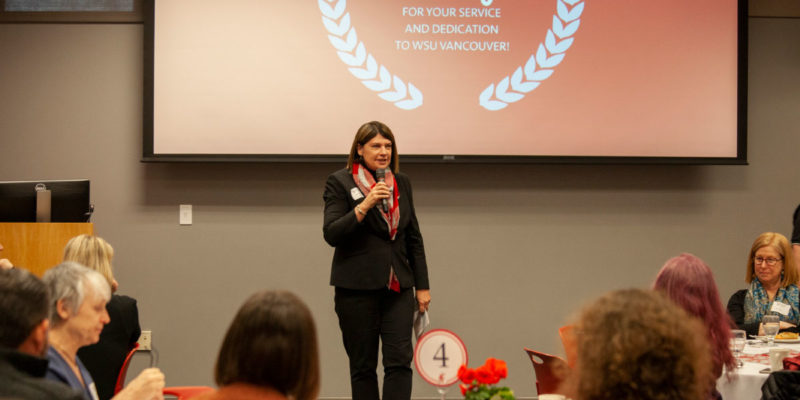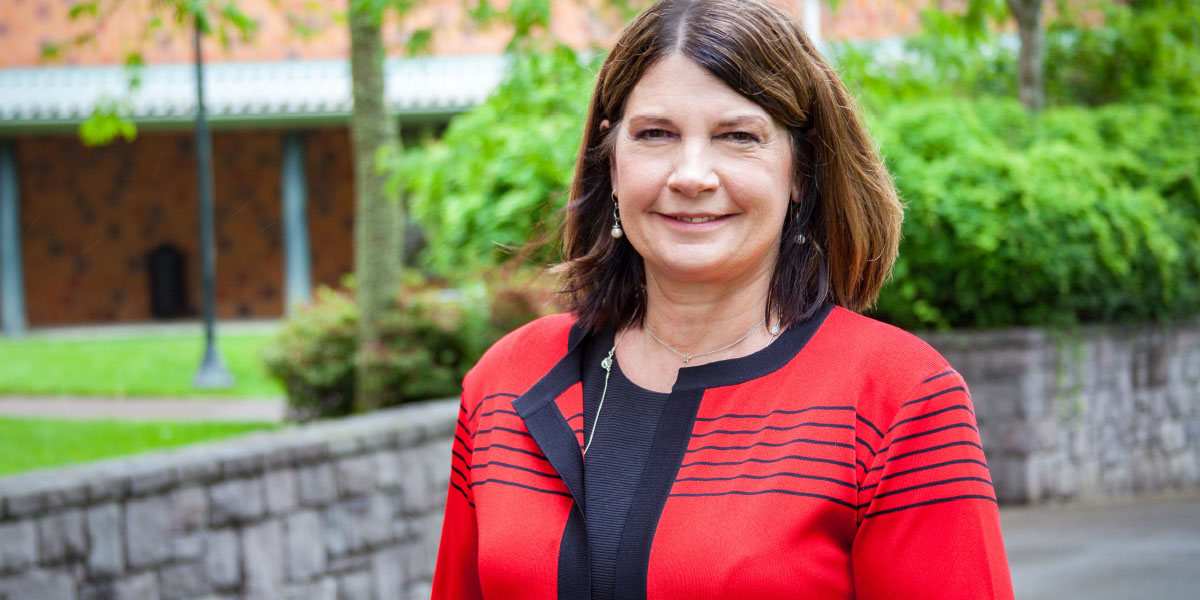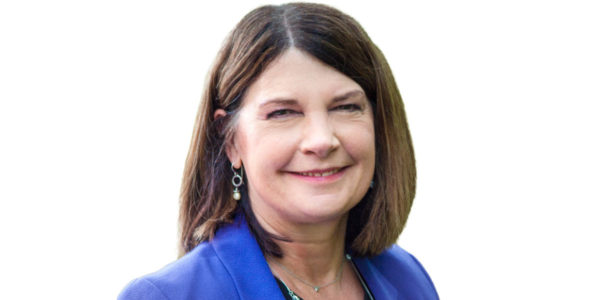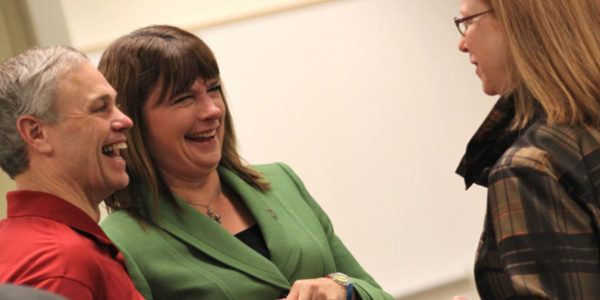Lynn V. Valenter is a strong believer in the power of professional development and the importance of building positive relationships in preparing CBOs to deftly address the evolution of their campuses and the increasing dynamism of their own roles.
“Education is transformational,” she says, but that education shouldn’t end just because you’ve earned your degree and framed it on the wall. “Teaching and learning have always been core to my values.” As CBOs lay the groundwork upon which to build the institutions of the future, they must always be tuned in to changing dynamics, anticipate what is waiting over the horizon, and be ready to adapt their approaches and revise their plans.
Much like parenting, where “we wouldn’t really know if we’ve done a good job until our kids are about 30,” Valenter knows that the work of higher education is a long game, where the payoffs from up-front investments aren’t necessarily seen for years or even decades.
For Valenter, one of the most important and pressing ways CBOs and business office professionals can ensure the viability of their institutions in the future is by communicating the value of higher education to their legislators and communities in the present, and this is an area where she sees room for improvement. “For us, it’s just a given that higher education transforms lives,” she says, but in order to counter the increasing criticisms leveled at higher education, leaders must be better equipped with clear outcomes and credible facts. And Valenter sees business officers as particularly well-positioned to spearhead this work.
During her more than 20 years at Washington State University (WSU) Vancouver, including nearly 15 years in her current position as vice chancellor for finance and operations and two years as interim chancellor, Valenter has helped ensure the university’s vibrancy by managing a $53 million budget and providing leadership in the areas of budget and accounting (including grants and contracts), capital planning and development, dining services, facilities operations, human resource services, and public safety.
In this interview with Business Officer magazine, Valenter discusses the importance of communicating the value of higher education, the unique credibility that business officers can bring to this process, and some of her goals as NACUBO’s board chair for 2019–20.
What is happening at this moment in the field of higher education that you are passionate about?
My big passion is demonstrating the value of higher education. Those of us who work in higher ed do so because we believe in it. We know that higher education transforms lives, especially young people’s lives. It’s just such a wonderful purpose.
Currently, there are so many criticisms being leveled at higher education that it feels like it is under attack. But these criticisms are largely misplaced. Take, for example, the opinion that college has grown so costly that it may no longer be worth the expense. In fact, the cost of a college education has not increased significantly in the public sector. It’s just that the cost burden has largely shifted to students and families.
Institutions of higher education are also being politicized—pigeonholed as liberal institutions that are spreading progressive ideas. This is largely a result of the growing polarization our country is facing right now. In actuality, higher education institutions deliver the same value regardless of where leaders, teachers, or students fall along the political spectrum. Higher education improves one’s employment and health outcomes, among others. These improvements are neither conservative nor liberal—just better.
What do higher education leaders need to do to counter these criticisms?
We have enjoyed a long history of support for higher ed in this country, and those responsible for managing our nation’s institutions are not accustomed to defending them.
More than ever we are subject to the tyranny of the anecdote, especially those that undermine and skew public perception of the outcomes of higher education. We’ve likely all heard versions of that sensational account of a college student who graduates with $200,000 in student loan debt and can only find a job at a coffee shop. These kinds of scenarios certainly can happen. But when you broaden your perspective to consider the higher ed experiences of millions of people, the outcomes are just bulletproof.
So, we need to change our game a little bit. Higher education leaders simply aren’t used to addressing concerns about whether higher ed is a valuable endeavor because our understanding of its many benefits is so intrinsic to our commitment to what we do. We need to get geared up, particularly on the business side of the house. CBOs know how to work with administration, faculty, and communities. We’re not used to taking a clear, straightforward case that’s easily digestible to the general public. That’s been a reach for us that we need to get better at.
How can CBOs more effectively communicate the value of higher education to the general public?
We need to do a better job of elevating those anecdotes that highlight the power of higher education to transform people’s lives. We have tens of thousands of those. Practically any first-generation college student that you talk to will confirm that his or her experience was positively life-changing.
CBOs also need to do a better job of providing curated, accurate, analyzed data, like the slide deck that NACUBO created to accompany its 2019 Perceptions and Priorities post on Medium. These data can help us create the foundation of our story.
One challenge business office professionals face is that they want to footnote everything to ensure that it’s 100 percent accurate. While we’ve needed to do that to work with our faculty and our legislatures, we need a different game plan when working with the general public. They’re not going to delve deep into the details. They want to see the big picture, and we need to communicate that picture in a simplified way.
Another challenge for CBOs is that, traditionally, we have not been accustomed to communicating with the public. CBOs can begin by reaching out and spreading the word about the value of higher education to the business community. This is a great audience to start with because we speak the same language and both know how to read and interpret financial statements. Business people are part of the broader community that we need to reach and can be that first bridge to the general public.
Are CBOs communicating with legislators effectively?
While we CBOs have been doing a much better job of speaking with legislators, there is still room for improvement. When NACUBO has brought its board, staff, and members to Capitol Hill for Advocacy Day, legislators and staff sometimes have asked questions that, frankly, just didn’t make any sense. This is because they don’t have a good grasp of the underlying issues. Business officers can help to illuminate these issues and—because we tend to be concrete and data-based—we can do so in a way that is credible.
There is a lot of misinformation out there. Business officers have credibility that we shouldn’t hesitate to draw upon. When someone says, “Well, everybody graduates with $100,000 in debt,” we can rely on our knowledge of the facts to ensure that the conversation is fair and accurate. Being out front, as it were, and making the case for higher education needs to become part of our toolkit. This is one of the ways we can raise the conversation about the value of higher education to the national level.
How can CBOs best leverage this credibility as they begin or delve deeper into their advocacy efforts?
I believe that most legislators run for office because they want to help make a difference, and I’ve certainly found that the legislators who serve the Vancouver area want to understand higher ed.
But the business of higher education can be complicated. Many legislators just don’t have a firm grasp on how it functions, instead relying on memories of their own college experiences, which for some was quite a while ago. For example, legislators may have difficulty understanding why your students can’t simply put themselves through school by working a summer job because that’s how they did it.
I recommend reaching out to legislators even before their first legislative session and talking to them about the basics of higher ed—explain to them how student debt actually works. By walking legislators through some of the fundamentals, and specifically not with an agenda, CBOs present themselves as neutral figures who are reliable sources of information. Then, when an issue arises, you will have built a foundation of trust and mutual understanding from which to launch your discussions.
What is NACUBO’s role in educating lawmakers and the general public about the benefits of higher education?
NACUBO has the standing and the resources to lead the public conversation. One of its most important resources is its passionate professionals. Being further removed from higher ed, they have a better perspective on that external constituency that we’re trying to reach and can help business officers and affiliated parties make the case for higher education. But, you can’t dictate news, right? You have to be newsworthy. So, how is it that we become newsworthy, and how do we communicate what is newsworthy about higher education?
What are some newsworthy messages around higher education?
There are both public and private goods that result from an individual being educated. The private good is primarily economic, but also includes improved health outcomes for individuals and their children. But, if we’re going to keep the message simple, it is this: Getting an education matters because, by some estimates, over one’s lifetime a person with a baccalaureate degree will earn, on average, nearly a million dollars more than a person with a high school diploma alone. That’s powerful.
It can be tempting to get mired in the caveats to this scenario, such as when one spends too much to get a degree or gets a degree in a field where it’s hard to gain employment. Our critics say that higher ed is not for everyone. Given that 80 percent of well-paying jobs require at least some education or training beyond high school, we may need to speak to the fact that post-high school education benefits everyone, but that there are multiple paths.
NACUBO has also done a good job of talking about the benefits of higher education to society. As illustrated in NACUBO’s 2019 Perceptions and Priorities slide deck online, college graduates pay more in taxes and are more likely to volunteer and vote. Ultimately, the value proposition of our traditional universities—and, to some extent, online universities—is bulletproof: Higher education delivers greater income and better outcomes over one’s lifetime.
How has communicating these simplified messages translated into results for higher education?
Frequently, state legislators do want to invest in higher education, but they find that there are just too many pressing needs vying for limited budget dollars. States need to better understand that there is, in fact, economic benefit to them investing in higher ed.
It is unlikely that any state will decide to fully fund four years of college, but they can certainly do a lot better. In my home state of Washington, the legislature mandated a tuition reduction of 10 percent and 5 percent in the previous biennium, then backfilled it with state funding. So, we didn’t raise tuition, but we also didn’t have more resources. The state admirably tried to lower tuition for its students and families.
If more states followed suit, their citizens and communities would certainly reap the benefits. As leaders in higher education, our first step is communicating this value in a simple and straightforward manner.
Tell us a little about WSU Vancouver and its value to its own community.
First of all, I’m certain that all communities value their institutions of higher education, from community colleges to doctoral research universities. Higher education provides indisputably positive value propositions for students. It is also an economic engine, attracting an educated workforce that ultimately leverages economic development.
WSU Vancouver was founded in 1989 in large part to elevate the baccalaureate attainment rate in Southwest Washington, which at the time was 16.9 percent. It was not an educated community. The shipyard industry in Vancouver boomed during World War II, but by the end of the century it really had to transform itself into a different type of economy. Education was one of the key ways to accomplish this.
The largest employers in our area are K–12 schools, as is typical with many communities. So, the education WSU Vancouver provides teachers is critical to elevating the community overall.
When thinking about the value proposition of WSU Vancouver as it relates to the future of the community, it is important to know that one of the things that’s unique about our area is that 92 percent of our graduates stay local. We’re working on a “grow-your-own” strategy. Currently, many of our local startups and industries—such as software development, microdevices, and measurement specialties—import graduates from the Seattle area. We’re seeking to build that workforce locally. Already our mechanical engineering program is highly desired, and we’re looking to further build out our computer science program.
How did you become involved with NACUBO, and what lessons did you learn along the way?
I’ve had a number of roles that led me to become involved with NACUBO and ultimately become its board chair. I originally came from the hospitality industry. When I got involved with WACUBO it was through its professional development workshops, starting as a site coordinator and then as part of the workshop committee, which does the programming. Next, I joined the steering committee and was ultimately invited to be on the board.
Prior to my current role, I was a community college faculty member in the Maricopa system. Teaching and learning have always been important to me. Engaging with WACUBO gave me deeper insights into professional development and educating adults. This experience was a bridge that helped me understand what programming people wanted or needed, but maybe didn’t know that they wanted or needed. Through my experience with WACUBO, I also learned how to package and deliver programming in a way that elevates outcomes. Eventually, I came to NACUBO as a member of its comprehensive doctoral committee.
How is NACUBO successfully supporting the work of its members?
My own work with NACUBO has taught me a lot about how to be an advocate for higher education and why it is important. I’m certain that NACUBO is reaching many members in this way.
Also, many of us on campus are expected to be knowledgeable about and lead conversations on whatever the current hot topic is. There’s just so much good information out there; NACUBO white papers do a great job of presenting issues, facts, data, and options without necessarily taking a position. They are a great resource.
What do you hope to accomplish as board chair?
NACUBO is poised to pursue the priority areas listed in its strategic blueprint. This will help ensure that NACUBO is an indispensable 21st-century association with compelling member value. I’m looking forward to bringing energy to NACUBO’s new mission and leadership.
More specifically, I would like to look into how the Economic Models Project 2.0 can help our institutions become stronger. The economic model for colleges and universities is not the same as it was 10 or 20 years ago. Helping institutions figure out what they need to be strong in the future is a place where we can do more meaningful work and really help our member institutions. And, along the way, we can make sure that institutions that are thriving are keeping an eye on the horizon and adapting as needed to avoid any sea change.

What excites you about being on the NACUBO board?
It is so exciting to be working with people who are leading the conversations about higher education nationally. As business officers, we tend to stay in our lane. But there is a bigger, broader dialogue that is also important for us to engage in—one that includes voices from different states, and public and private institutions.
Individually, we come from different situations. It is in shaping and broadcasting our industry’s collective voice in support of higher education where NACUBO really excels. It is just incredibly energizing. Every person I meet in the NACUBO universe is so smart, cares so much, and is so dedicated. It feels like drinking from a fountain of energy and excitement. And that’s lovely and powerful.
What is an example of an invaluable skill that you have learned over the course of your career?
Several years ago, I attended a three-day training put on by the state on facilitating and managing meetings, and discerning different ways to sort and prioritize information. I didn’t realize so at the time, but this training would be absolutely invaluable as I stepped into the role of interim chancellor at WSU Vancouver.
As interim chancellor, I was expected to come up with huge deliverables in such a short period of time, and I needed my academic colleagues to drive the conversation. One of the tactics I learned during my training was to ask everyone what is the one nugget of information that he or she wanted to share. This approach allowed me to draw on the expertise of our entire leadership group and facilitate a meaningful discussion that reached an outcome within the time parameters. That training was such an unanticipated gift, and I believe it was a huge part of why I was successful.
What are your thoughts on your time as interim chancellor?
It was an extraordinary opportunity to become more knowledgeable about the academic and student affairs areas on campus. I also got to work more closely with students, which was extremely rewarding—and fun! My experience as interim chancellor really reflects the evolving role of the CBO. Increasingly, CBOs are expected to be familiar with every aspect of an institution in order to be prepared to take on a variety of more public leadership roles outside of the business office. But that’s another gift that business officers have. We’re happy to cast the net broadly and to consider many things. We don’t consider our job done until we have deliverables and measurable outcomes and bring it home. It is situations like these to which business officers are well-suited and in which they can thrive as leaders.
What are some lessons that you’ve learned in your career?
I recently facilitated a women’s leadership panel for WACUBO during which some of the speakers discussed their failures. The examples that were most compelling to me were those I would consider more of an ethical lapse. It wasn’t that the person in question had done anything wrong but that they had allowed something wrong to happen and didn’t stop it, which became particularly difficult when the wrongdoer was a leader or someone in authority. Scenarios like these are especially difficult when you’re young, in part because you are still learning about the business world and are unsure of the norms and what’s acceptable and what’s not.
Similarly, most of what I would call my own failures or lapses were early in my career before I was even in higher ed. It took me some time to understand that it was OK not to respond right away and that I had the power to say, “I’d like to give that some thought.”
The choices we make in higher ed have long-term consequences. Taking a moment to reflect on possible courses of action is wise and thoughtful and not necessarily intuitive for most of us. My recommendation is, especially if you are early in your career, if you’re asked to do something and you’re not sure about it—particularly by someone in authority—take the time to think about it.
What advice do you have for CBOs?
It is really important for people who are active in business offices—not just CBOs—to access ongoing professional development. For many of us, we don’t change jobs often, so one way to stay fresh and energized is through professional development. On a personal note, the quality of the people I’ve met who do invest in their own professional development is extraordinary.
I recommend that business office professionals get involved with NACUBO or the appropriate regional organization, whichever resonates with them. When I first joined the NACUBO comprehensive doctoral committee, I was so impressed by the caliber of the individuals I met and the amazing things they were involved in. Professional development helps elevate not just your subject matter knowledge, but also your passion and your excitement.
We need to be able to help lead those conversations that will prepare our institutions to meet the future. To do that, we need to continue to learn and grow, and NACUBO is the best resource imaginable for educating ourselves and preparing us to look out over that horizon.
What are the top three skills needed to be an effective CBO who moves the institution forward strategically?
CBOs need technical subject matter expertise, communication skills, and a penchant for collaboration. Technical subject matter expertise is required because often CBOs are the only resources in the room for this information. We need to be dependable and credible sources and, frankly, if you’re not competent at what you do, you’re not going to have credibility. So competence stems from technical subject matter expertise, as do ethics and transparency. It is the base of what you need as a chief business officer.
CBOs also need to be able to communicate effectively, both internally and externally, and that starts with thinking about your audience. Once you understand what is important to your audience and how they like to take in information, for example, then you can hone your message in a way that leaves them with the knowledge you want them to have.
Delving into the wonky details is important for some audiences, but not all of them, so this means that CBOs need to be able to explain finances in an understandable manner. Almost everything we do within higher ed is within a shared governance model. But our faculty partners are not finance officers, nor would we expect them to be. When we’re asking them to weigh in on matters that have a business or financial impact, we need to give them the tools to be able to make good recommendations and remain responsible stewards of the institution. Being able to present information to our colleagues outside of the business office in a manner that they can understand is crucial to moving our institutions forward.
In higher ed, we hardly do anything by ourselves, so being able to collaborate—within our units, with our peers, within our communities—is a must. Higher ed is generally good at collaboration and shared governance but can falter when it comes to reaching results. The collaborative process is an opportunity for CBOs to call upon their superpower: the ability to drive outcomes.
When I begin collaborating, the first thing I do is seek to understand where my collaborators are coming from and if they have any kind of tentative outcomes that they’re driving toward. To be successful at collaboration, you also have to “show up” by being prepared, genuine, and ready to represent your interests.
How do you approach the collaborative process?
I’m of a school of negotiations where, typically, I’m very open about not only my goals, but also about scenarios that just won’t work for me, which are often dictated by laws or ethics. I try to enter the collaborative process with a “you need to understand me, I need to understand you” approach and a commitment to figuring out something that all parties can benefit from.
Working within higher ed is about fostering long-term relationships. In order to work well, emerging CBOs need to be careful to start as they mean to continue because, just to use myself as an example, most of the relationships I have in higher ed are decadeslong. If I had mistreated people or tried to optimize my outcomes to their detriment 20 years ago, my relationships could still be experiencing negative ramifications from that mistreatment.
Can you share examples of building these positive relationships over time?
I work on a lot of land use and capital projects. When I first started at WSU Vancouver, we were building a new project about every two years. So, I’m not the kind of developer who comes into a community, facilitates a project, and then leaves. I am a developer who is an ever-present member of the community with projects that are ongoing. It is of the utmost importance to the school’s reputation within the community that I am seen to represent facts and considered an honest and respectful negotiator.
MARTA PEREZ DRAKE is senior vice president, member engagement, NACUBO.






